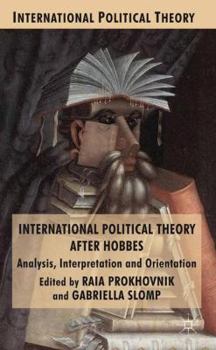International Political Theory After Hobbes: Analysis, Interpretation and Orientation
Select Format
Select Condition 
Book Overview
The idea of international political theory after Hobbes is a timely and lively focus through which to raise key questions about international politics, and to set up dialogues between historical political theory and contemporary theories of international relations about the legacy of Hobbes in international politics. The move by political theorists towards consideration of the international realm and the consequent blurring of the distinction between domestic and international politics over recent years has been marked. In the light of these changes, the role of Hobbes in the dominant realist theory of International Relations requires urgent re-examination. This book makes an important and distinctive contribution to the argument that international political theory is moving beyond the reading of Hobbes as a founding theorist of the modern state inan inter-state system perpetuated by orthodox International Relations. The volume brings together a set of internationally-respected researchers with an expertise on Hobbes' views on international relations in the context of the history of political thought, Hobbesian realism, and on Hobbes and contemporary international political theory.





